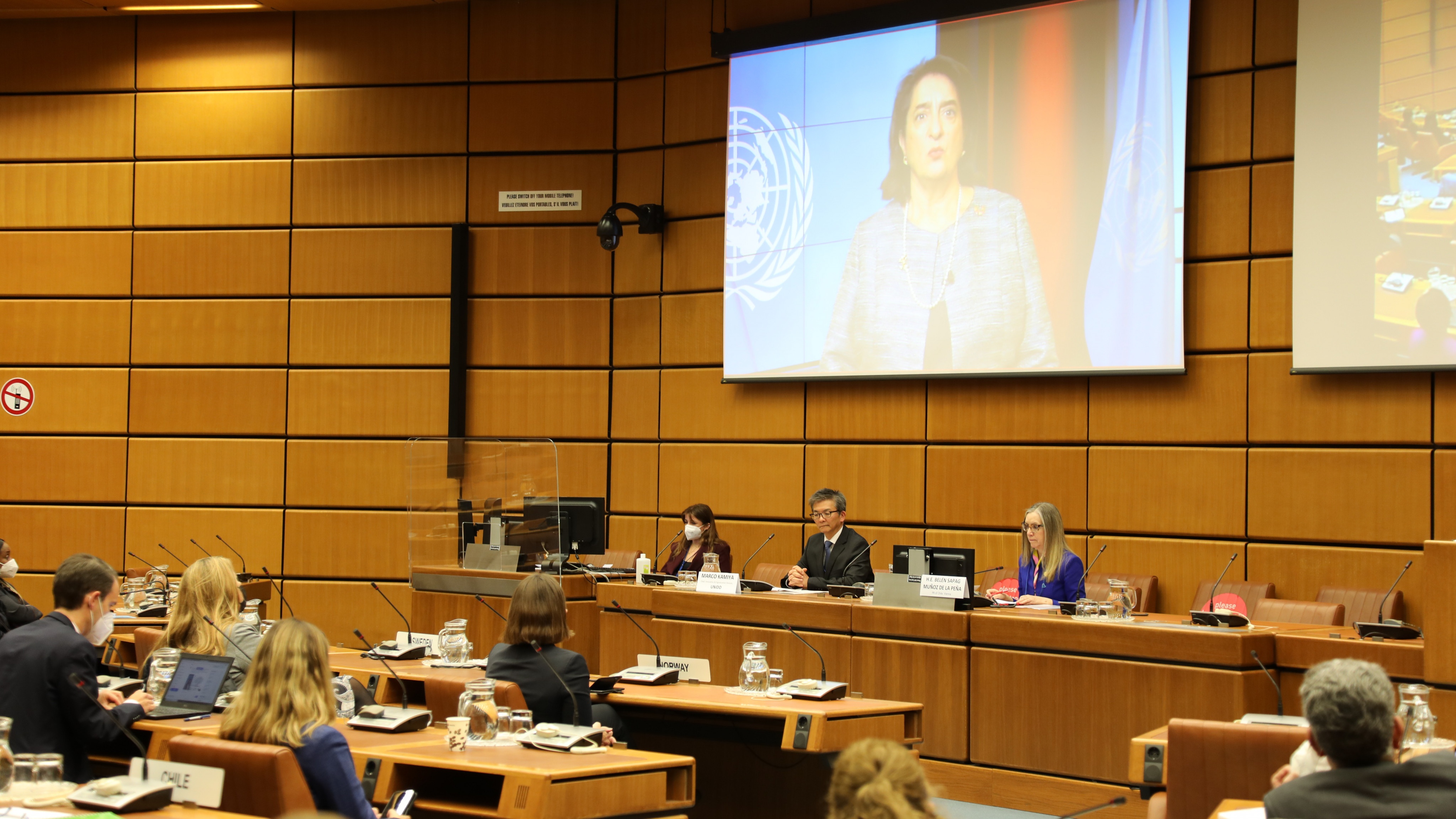Vienna Discussion Forum 2021: “Cyber Equality and Digital Inclusion”
04 November 2021

Vienna, 4 November 2021 – UNIDO and UNODC, together with the Permanent Missions of Finland, Norway and Sweden in Vienna, hosted the third annual Vienna Discussion Forum (VDF), a platform to discuss gender equality in the framework of the Sustainable Development Goals.
The 2021 Vienna Discussion Forum focused on existing challenges in regard to women and girl’s access and participation in Artificial Intelligence (AI), Digital Transformation and the Fourth Industrial Revolution, but also how these can provide an opportunity to harness converging technologies in order to create an inclusive, sustainable and gender-equal future. In the high-level opening ceremony, UNIDO Director General LI Yong acknowledged that these inequalities stem from the deeply rooted social and cultural inequalities women and girls experience globally which “are preventing women and girls from having equal access to digital infrastructures, devices and services, that are becoming an increasing part of our daily life and work.”
The situation is made worse because women lag behind men in the use of the internet by as much as 20% globally, resulting in a vast underrepresentation of women actors in the development of new technologies, as pointed out by Assistant Secretary-General for Policy Coordination and Inter-Agency Affairs and Officer-in-Charge of the Office of the UN Envoy on Technology, Maria-Francesca Spatolisano. Hence, the gender digital divide means women and girls’ voices are not taken into consideration in technological development.
UNODC Executive Director, Ghada Waly, further highlighted that digital environments and new technologies have brought new challenges. She noted that women are being disproportionately targeted by various forms of online abuse and that this is especially true for women from specific racial, ethnic, religious backgrounds, or those having disabilities or diverse sexual orientations.
To conclude the high-level opening ceremony, the State Secretary to Minister for Gender Equality of Sweden, Karin Strandås, reminded the audience that gender equality is not only an issue of concern to women and girls as it benefits society as a whole. In order to achieve it, the involvement and commitment of men and boys as well as women and girls is crucial; even more so in regard to emerging technologies which present an opportunity to break old patterns of inequality and discrimination.
Online abuse is thus another factor for women’s lack of involvement, as it deters girls and women from active participation. More needs to be done to stop predators from misusing technology to facilitate abuse. Instead of replicating existing inequalities in society, the full potential of new tech should be explored to advance inclusion and promote women’s rights.
The high-level speakers set the framework for the discussion, and were followed by an expert panel with representatives from civil society, the private sector and the United Nations, moderated by Belen Sapag Muñoz de la Peña, Permanent Representative of the Republic of Chile to the United Nations in Vienna. The expert panel exchanged ideas on how the Fourth Industrial Revolution, AI and Digitalization Transformation can provide innovative solutions to tackle inequalities and create new opportunities for women and girls.
The panelists emphasized that digitalization needs to be gender-inclusive to ensure that inequalities are not reinforced in the process of technological development and digital transformation, especially due to the comparatively low representation of women working in STEM fields. If nothing is done to address this, the severe lack of diversity in the workforce that invents, designs, develops and disseminates technological services will most likely lead to the development of frontier products that further mirror societal inequalities and biases. Artificial intelligence, Digital Transformation and the Fourth Industrial Revolution are fundamentally changing the way we live, work and interact with each other. It is thus vital that technological developments do not exacerbate discrimination but contribute to an inclusive and diverse society.
Despite the challenges, the panelists were optimistic that the Fourth Industrial Revolution presents many new opportunities to harness technologies to create an inclusive, sustainable and gender-equal future. Digitalization can support women in accessing key productive resources and other services, such as accessing justice for victims of gender-based violence. This is more important than ever as the COVID-19 pandemic has exacerbated pre-existing inequalities for women, including gender-based violence, cyber-stalking and sexual online harassment.
The 2021 Vienna Discussion Forum concluded with the panelists agreeing that developing more inclusive technologies will have many positive effects for the society as whole. Being aware of the benefits of diversity and inclusion and addressing conscious and unconscious bias, will help create digital environments that are enabling and safe for women and girls to be leaders of technological change. The panelists agreed that the international community has a vital role to play in ensuring gender inequalities are not perpetuated in the development of the Fourth Industrial Revolution. The panelists called for the forging of partnerships with the private sector and civil society organizations to make cyber equality and digital inclusion a lived reality for all.
The outcome document of the 2021 Vienna Discussion Forum, a set of recommendations for gender-responsive policymaking for cyber equality and digital inclusion, is available for download here.
You can watch the recording of the Vienna Discussion Forum 2021 here.
You can also read about the Vienna Discussion Forum 2020 here and here.
Find more information about the inaugural Vienna Discussion Forum 2019 here and here.